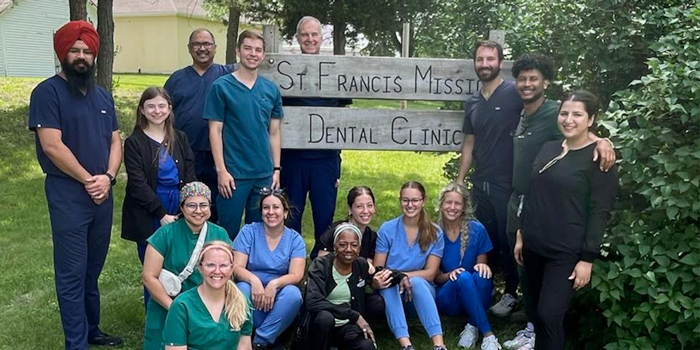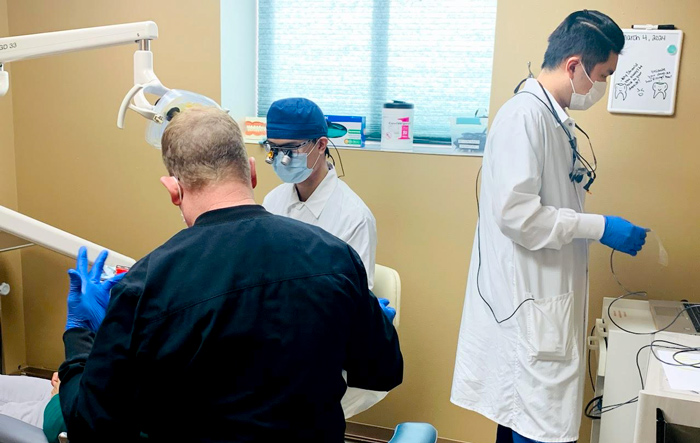St. Francis Mission Dental Clinic
- Need: To improve oral health among the residents of the Rosebud Reservation in South Dakota.
- Intervention: St. Francis Mission founded a dental clinic, staffed by volunteers from across the country, to offer free oral healthcare to residents of the Rosebud Reservation.
- Results: The clinic typically offered 20 one-week clinics every year and served 3,000 patients after transitioning to electronic records in 2021.
Description

The St. Francis Mission Dental Clinic opened in 2013 in the small town of St. Francis on the Rosebud Reservation in South Dakota. At the time, there were no dentists practicing at the local Indian Health Service facility in nearby Rosebud. Additionally, St. Francis Mission leadership became aware of extremely high rates of chronic tooth decay and gum disease among the local population. In response, the Mission collaborated with numerous partners and donors to open a dental clinic, staffed by volunteers from across the country, to offer free oral healthcare to residents of the Rosebud Reservation.
Small groups of volunteer dentists, assistants, hygienists, and students from across the country visited the clinic for short trips each year to provide free care. The following institutions have partnered with the clinic to provide short-term volunteer services:
- Creighton University
- University of Connecticut
- University of Indiana
- University of South Dakota Dental Hygiene
- A.T. Still University
- University of Missouri – Kansas City
- University of Nebraska Medical Center College of Dentistry
The clinic operated as an LLC with a small local staff consisting of enrolled tribal members. The dental clinic closed its operations in 2024. SFM is currently working with the Rosebud Sioux Tribe's Health Administration to have the tribe take over and fund the clinic, with the possibility of reopening in 2025.
Services offered

The following services were available to St. Francis Mission Dental Clinic patients:
- Diagnostic services
- Preventive care
- Restorative care
- Endodontics
- Periodontics
- Prosthetics
- Oral surgery
There was no income requirement to receive services at the clinic. During weeks when volunteers were not offering a clinic, community members were offered free toothbrushes and assistance with referrals and Medicaid enrollment.
Visiting volunteers were offered accommodations, daily lunch, tours of the local church and historical museum, and the opportunity to participate in a sweat lodge ceremony.
Results
The clinic typically offered 20 one-week clinics every year and served 3,000 patients after transitioning to electronic records in 2021. The clinic estimated the total value of all services provided since 2021 to be $3,114,035.
This short video features patient testimonials:
In 2020, the clinic was featured in the National Rural Health Association's Compendium of Rural Oral Health Best Practices.
Challenges
Clinic leadership identified funding and volunteer recruitment as the biggest challenges. They were continually seeking new volunteers and funding partners to support the work of the clinic.
Contact Information
St. Francis Mission Dental Clinic605.747.2361
info@sfmission.net
Topics
Access
· Community and faith-based initiatives
· Community engagement and volunteerism
· Oral health
· Tribal communities
States served
South Dakota
Date added
August 2, 2024
Suggested citation: Rural Health Information Hub, 2025 . St. Francis Mission Dental Clinic [online]. Rural Health Information Hub. Available at: https://www.ruralhealthinfo.org/project-examples/1145 [Accessed 20 February 2026]
Please contact the models and innovations contact directly for the most complete and current information about this program. Summaries of models and innovations are provided by RHIhub for your convenience. The programs described are not endorsed by RHIhub or by the Federal Office of Rural Health Policy. Each rural community should consider whether a particular project or approach is a good match for their community’s needs and capacity. While it is sometimes possible to adapt program components to match your resources, keep in mind that changes to the program design may impact results.
